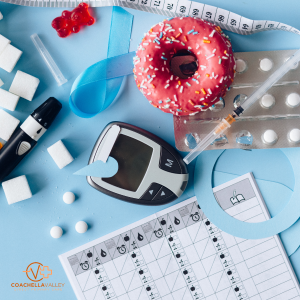Your A1C level, also known as hemoglobin A1C, provides a snapshot of your average blood sugar levels over the past two to three months. It’s a valuable tool for diagnosing and managing diabetes. However, when your A1C shifts unexpectedly—either rising or falling significantly—questions and concerns often follow. Whether you’re living with diabetes or monitoring your levels for prevention, it’s important to understand what these sudden changes may mean for your health.
Read more:
Read more: Coachella Valley Air Alerts: What They Mean for Your Health
Why A1C Can Rise Suddenly
Medication Changes or Missed Doses
One of the most common culprits behind a rising A1C is a change in medication routine. Missing doses of insulin, oral diabetes medications, or other prescribed drugs can quickly result in elevated blood sugar levels, especially over time.
Read more: How Does Low Testosterone Affect My Sex Drive?
Dietary Habits and Lifestyle
Even small, repeated dietary indulgences—extra sugar in coffee, more frequent snacking, or eating out—can contribute to higher average blood sugar. If your physical activity has decreased or stress levels have spiked, those factors may also cause a sudden uptick.
Read more: The Surprising Health Benefits of Living in the Desert
Illness or Infection
Acute illness, injury, or infection can lead to a spike in blood glucose levels due to increased cortisol and adrenaline production in the body. This response is natural but can throw off glucose management and inflate your A1C—even if only temporarily.
Read more: Coachella Cough and Festival-Related Health Concerns
Inaccurate Testing or Lab Variability
Sometimes, a sudden change in your A1C may be due to something as simple as a lab discrepancy. While rare, differences in how labs process blood samples or slight variations in test quality can lead to misleading results. That’s why many providers recommend repeating the test before making major changes to your care plan.
Read more: Chronic Disease vs. Acute Disease
Why a Sudden Drop in A1C Can Also Be Concerning
 Unintended Weight Loss or Malnutrition
Unintended Weight Loss or Malnutrition
If your A1C drops without purposeful changes in diet, exercise, or medication, it may signal something else—such as unintended weight loss, malnutrition, or even a new underlying health condition like thyroid dysfunction or kidney disease.
Read more: Benefits of Going Sugar-Free for a Month: What to Expect
Medication Overcorrection
Aggressive medication changes or dosing errors can also drop A1C rapidly. While lowering A1C is often a goal, doing so too fast can increase the risk of hypoglycemia, especially for those on insulin or sulfonylureas.
Chronic Health Conditions
Certain chronic conditions, like liver disease or anemia, may affect hemoglobin levels and artificially lower A1C readings. It’s important not to interpret this kind of drop as a sign of improved glucose control without evaluating the whole clinical picture.
Read more: Pickleball for Weight Loss: Here’s What the Science Says
When to Speak to a Healthcare Provider
Sudden changes in A1C—up or down—should not be ignored. While not always cause for alarm, they warrant a conversation with your healthcare provider. Your provider can assess potential causes, review your medications, order confirmatory labs if needed, and help you adjust your care plan safely.
Read more: Boost Your Longevity: Live Longer in 5 Easy Steps
FAQ: Sudden A1C Changes
How much of a change in A1C is considered significant?
- A shift of more than 0.5% in a three-month period—especially without lifestyle or medication changes—is usually considered significant. A full percentage point increase or decrease is definitely worth discussing with your provider.
 Can stress really impact A1C that much?
Can stress really impact A1C that much?
- Yes. Chronic or acute stress can raise cortisol levels, which in turn raises blood glucose. Over time, this can lead to a noticeable increase in your A1C even if your eating and exercise habits stay the same.
My A1C dropped a lot but I haven’t been eating better—should I be worried?
- Possibly. A sudden unexplained drop may indicate medication overuse, liver issues, or anemia. If you’re also experiencing fatigue or weight loss, schedule a medical evaluation as soon as possible.
Can anemia or blood disorders affect A1C readings?
- Absolutely. Since A1C measures glucose attached to red blood cells, any condition that affects red blood cell turnover—like anemia, recent blood loss, or hemoglobin variants—can skew your results and may require alternative testing like a fructosamine test.
What counts as a “sudden” or “significant” A1C change?
- Small swings can be measurement noise. Even the same sample can yield readings of 6.4–7.2% when initially measured, which is consistent with 6.8% due to analytical variation. Therefore, confirm unexpected results before overreacting. Larger shifts that also align with your glucose/CGM trend are more likely to be real.
How fast can A1C rise or fall?
- A1C reflects ~3 months, but the last 30 days weigh most—so meaningful changes typically appear over weeks to a few months, not days. Effective therapies (e.g., GLP-1s like semaglutide) commonly lower A1C ~0.6–1.6 percentage points across trials.
Could lab error or test method differences explain a jump?
- Yes. Pre-analytical issues and assay differences can affect results; if a value appears inconsistent with your logs/CGM, repeat the test and/or use a laboratory that uses NGSP-certified methods. For diagnosis, guidelines require a second, confirmatory test on a different day.
Can stress, illness, or steroids cause a sudden rise?
- They can raise glucose for days to weeks (stress hormones; steroid effects), which then pushes A1C higher if sustained. If you’ve been ill or took prednisone/dexamethasone, discuss timing with your clinician.
Which conditions make A1C inaccurate (false high/low)?
- Hemoglobin variants (S, C, D, E), anemias, CKD/uremia (carbamylated Hb), liver disease, pregnancy, recent transfusion/bleeding, and altered RBC turnover can distort A1C (false high or low), depending on method. Consider glycated albumin/fructosamine when A1C is unreliable.
Should I repeat A1C if the number doesn’t fit my meter/CGM?
- Yes—first verify with a repeat or an alternate test (FPG/OGTT, fructosamine) and check for interferences. For stable patients, routine repeats sooner than ~3 months aren’t useful; but an unexpected result merits earlier confirmation and method review.
Can weight loss, diet, and exercise move A1C quickly?
- Sustained behavior change lowers A1C over weeks to months (not overnight). Weight loss itself improves insulin sensitivity and A1C; pair nutrition, activity, and sleep consistently to see movement by the next 8–12-week test cycle.
Why would A1C drop suddenly—should I worry?
- A true drop can reflect better glucose control or medication effects, but artifactually low A1C occurs with blood loss/hemolysis, transfusion, pregnancy, CKD, liver disease, etc. If the drop doesn’t match your readings, investigate these causes.
Does pregnancy change how we interpret A1C?
- Yes. A1C is not used to diagnose gestational diabetes, and pregnancy/shorter RBC lifespan can lower A1C. Screening relies on glucose challenge/OGTT at 24–28 weeks; use caution when interpreting A1C in pregnancy.
My A1C changed, but my CGM “time-in-range” looks stable—what gives?
- A1C is a weighted average and can diverge from day-to-day patterns. Cross-check for assay issues/biologic interferences and discuss incorporating CGM metrics (e.g., Time-in-Range) alongside A1C for decisions.
Should I retest if my A1C result seems off?
- Yes. If you or your provider suspects an error, a repeat test or an alternative blood sugar test can provide clarity. Trends over time are often more important than one result.
Take Control of Your Health
If your A1C has shifted suddenly, don’t try to decode the cause alone. At Coachella Valley Direct Primary Care, we specialize in personalized, preventative care that empowers you to understand your numbers and make informed decisions. Whether you’re managing diabetes, preventing chronic illness, or simply staying on top of your health, we’re here to help you thrive—not just survive.
Schedule an appointment today with Dr. Krista or Dr. Mike and get clear answers about your A1C and your health. Your path to wellness starts with knowledge—and the right team by your side. Call Now 760-642-5549




